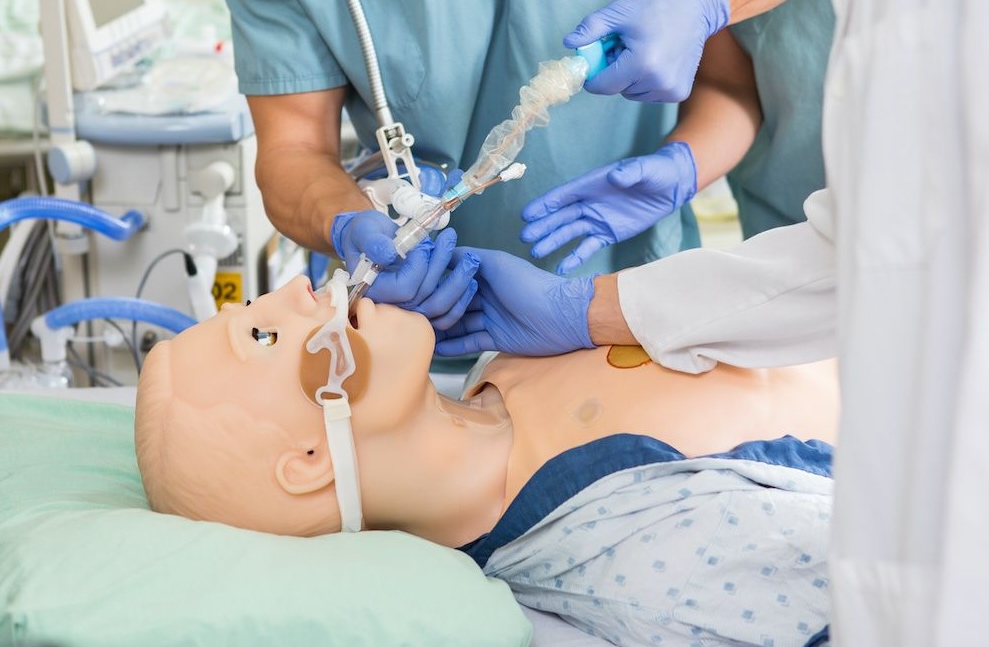Comprehensive Healthcare Simulation: Operations, Technology, and Innovative Practice is a must-own book for Medical Simulation programs looking to maximize the efficiency of their operations. From the basic theories to advanced practices, the latest healthcare simulation book has been praised by readers as a “Must Read” item for anyone operating, managing, or starting a medical simulation center. Today then, we take a closer look at the chapter on “Professional Development for the Healthcare Simulation Technology Specialist” from leading experts Suzan Kardong-Edgren, PhD, RN, ANEF, CHSE, FSSH, FAAN, Nurse Scientist at Texas Health Resources at Harris Methodist Hospital in Ft. Worth and Michelle L. Aebersold, PhD, RN, CHSE, FAAN, Clinical Professor Faculty Lead for Innovation, Research, and Technology Development at the University of Michigan School of Nursing. The ideas below present just some of the chapter’s numerous ways to help Sim Techs develop their professional healthcare careers!
The healthcare simulation technology specialist (HSTS) performs a myriad of functions within a simulation center. No single background is required or expected in this position, and no two centers have the same needs. Candidates with a variety of backgrounds and educational levels may be considered and used in this role depend- ing on the simulation center need. On-the-job training and a mind-set to innovate and improve are likely to produce the candidates with the best fit. Even so, most centers will have minimum expected entry-level qualifications for consideration.
Many entry-level positions in simulation technology require applicants to have earned an associate’s (AS)-level degree or higher in a related field, such as medical technology, computer science, or life sciences. Those with military experience can receive preference as such individuals are usually comfortable with technology, emergency medical situations, and simulated training experiences.
Individuals interested in higher-level positions may explore advanced level degrees, such as master’s or doctorate degrees. Currently, there are several programs that offer a Master of Science (MS) degree in healthcare simulation (interdisciplinary in nature) and MS in nursing education with an emphasis in simulation emerging around the USA.
There are also PhDs in simulation and modeling/gaming; however, at this time, these programs do not focus on healthcare simulation. Degrees in health services administration or business administration (MBA) might also be potential advanced degrees of interest to an HSTS. Specializing in computer programming, instructional design, education, leadership, and development would add depth and breadth to an HSTS’s résumé and to be seen as desirable by potential employers.
In addition to formal degree programs, certificate programs are another great way to enhance skills and add to a résumé. Completing certificate programs provides evidence of knowledge and skills to simulation center directors who may be hiring. These are different from certifications, such as The Society for Simulation in Healthcare‘s (SSH) established a certification program called the CHSOS (Certified Healthcare Simulation Operations Specialist) for individuals working in jobs that focus on simulation operations. This includes individuals who are in jobs that are titled HSTS, simulation specialist, simulation technician, simulation AV specialist, simulation coordinator, or many other similar titles. This certification is focused on the aspects of the practice that involve healthcare simulation modalities and technologies such as different types of simulators and task trainers, audiovisual equipment, software, hardware, simulation program management, and inventory and supply management.
There are also basic knowledge expectations of instructional design and healthcare concepts. This certification demonstrates the recipient has a level of advanced competency in simulation. Two years of experience and a bachelor’s degree (or waiver for equivalent experience) are required to apply. References from colleagues who can attest to the experience of the simulation operations expertise of the applicant are also necessary. The certification is a badge of distinction for an HSTS and can help when applying for a job and seeking internal advancement or when a center is applying for accreditation.
It may be possible in the near future for an HSTS to build credentials in the medical simulation field by collecting digital badges or stackable credentials. Stackable credentials are outlined by the US Department of Labor as a “sequence of credentials that can be accumulated over time to build up an individual’s qualifications”. Digital badges have become one method for demonstrating skills in this manner but are specifically managed online. As digital badges become more common for demonstrating new knowledge and skills for working professionals, the validity of these credentials and badges increases. Badges are being created and awarded by colleges and universities like Carnegie Mellon and Purdue and also companies and institutions like the Smithsonian and Disney-Pixar. In some cases, badges can be considered toward college credit. This may be a new way of learning on one’s own time and gathering credits toward an eventual degree.
Publishing a research article is another way to advance your career for simulation in healthcare. Publications in leading journals are considered to be even more valuable than providing oral presentations. Unlike a one-off presentation, published works are indexed and available for future review by others. To find topics, consider your passions, and then research previous articles to find gaps in the literature. Studies should build upon previous research to further explore specific areas not previously understood. Those still seeking ideas are encouraged to get in contact with a journal editor or research group to inquire about needed research within the field.
Finally, conference attendance is common and almost required as a simulation professional seeking to stay current or seeking advancement in the field. Attending a conference in a prepared manner and bringing knowledge back to other faculty and staff provide the lagniappe (a little something extra) that can make the HSTS a more valued member of the simulation team and can set them apart from the competition. Key global events include SimGHOSTS, INACSL, Patient Safety Movement Foundation, SESAM, ASPIH, FLASIC, ISQua and many more! See our comprehensive annual healthcare simulation conference page for the latest updates!
Previously We Shared Chapter Excerpts on:
- Medical Simulation Personnel
- Types of Healthcare Simulation
- Medical Simulation Methodologies
- Finding the Right Simulation Personnel
More Key Take Aways From Latest Simulation Operations Book Include:
- Practical guide helps prepare professionals for the broad scope of simulation in healthcare
- Defines the domains of medical simulation operations
- Focuses on the development of the healthcare simulation technology specialist
- Written and edited by leaders in the field of clinical simulation
Written and edited by leaders in the field, Comprehensive Healthcare Simulation: Operations, Technology, and Innovative Practice is optimized for a variety of learners, including healthcare educators, simulation directors, as well as those looking to pursue a career in simulation operations as healthcare simulation technology specialists. Grab your copy today:








